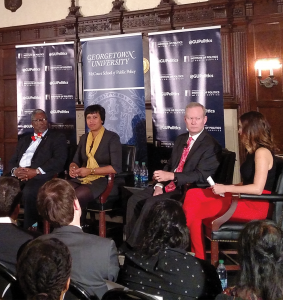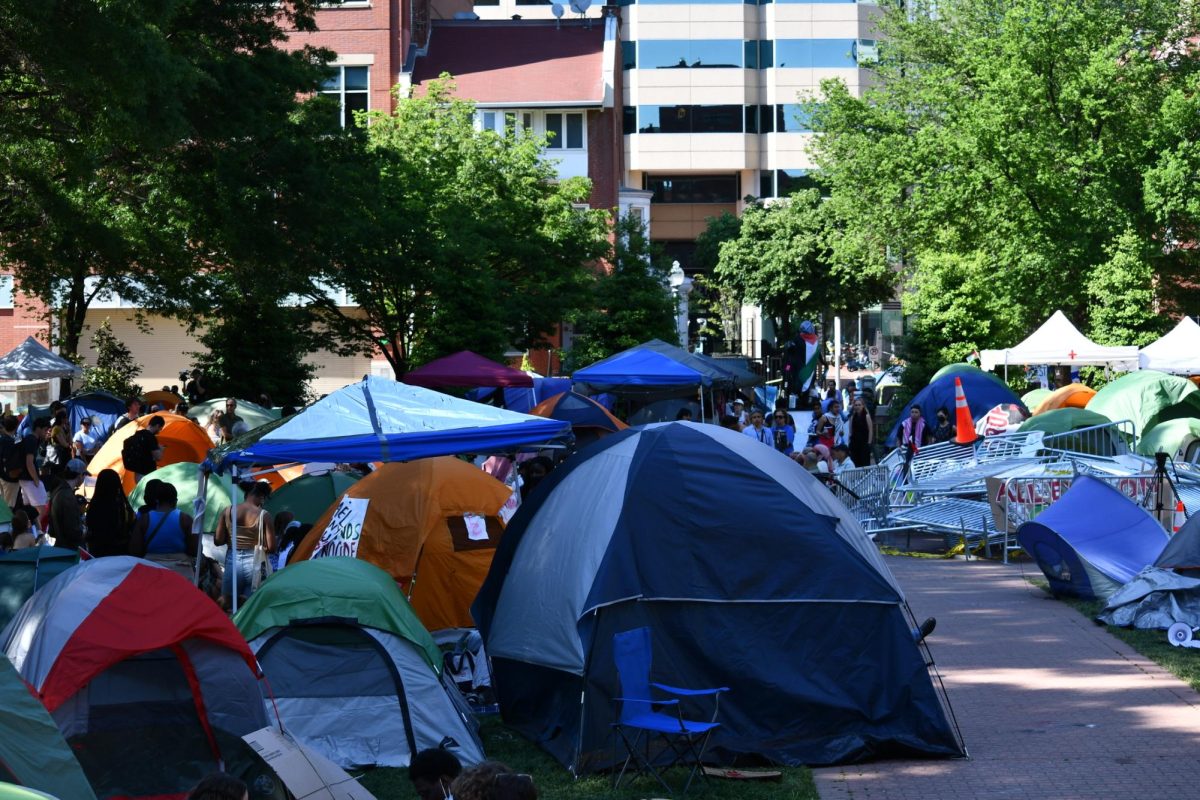
From left, Mayors Sly James, Muriel Bowser, Mick Cornett and Nan Whaley discussed policy solutions for various issues affecting their cities.
Mayors Muriel Bowser of Washington, D.C., Mick Cornett of Oklahoma City, Okla., Sly James of Kansas City, Mo. and Nan Whaley of Dayton, Ohio discussed strategies to combat economic inequality, increase the quality of education and reduce violence in their cities at a panel discussion hosted by the Georgetown Institute of Politics and Public Service in Copley Formal Lounge Jan. 20.
Over 100 students and faculty attended the discussion, titled “Building Cities of Opportunity for All: Policy Solutions for Equitable Economic Development”, the first event featuring 2016 IPPS fellow Alvin Brown, the former mayor of Jacksonville, Fla. The panel coincided with the 2016 U.S. Conference of Mayors in Washington, D.C. and was moderated by Brown and Erin Mullally (GRD ‘16), editor in chief at the Georgetown Public Policy Review.
Executive Director of IPPS Mo Elleithee opened the event by emphasizing that the panel was formed as a result of McCourt School of Public Policy students’ desire to hear from U.S. mayors during the 2016 U.S. Conference of Mayors meeting.
Executive Director of the U.S. Conference of Mayors Tom Cochran, who coordinated the mayors for the event, and President of the Georgetown Public Policy Student Association Jessica Clarke (GRD ’16) introduced Bowser, Cornett, James and Whaley.
Cochran emphasized the important role that mayors play in local government in their ability to affect meaningful and lasting change in their communities.
“What’s so beautiful about the mayors is that you can work for a congressman, you can work for a governor, but when you’re working for a mayor you’re making changes in people’s lives and also creating beautiful cities [like we have in the United States],” Cochran said.
The four mayors responded to questions on how to address high crime rates, spur economic development and increase educational quality in their cities. Cornett, a Republican, said Oklahoma City has relied on philanthropic endeavors to solve his cities’ social issues.
“Our efforts to try and keep taxes low, but get the philanthropy and the strong economy to support the social organizations that can help us with a lot of these issue, is a model that’s worked for us,” Cornett said.
Bowser, a Democrat, said D.C. is in a unique position as a city outside of state-level jurisdiction, but faces challenges dealing with Congress.
“We can actually push innovation through our system and really call on and call out our federal government for not the things that are so important,” Bowser said.
Bowser outlined three priorities the city will implement to facilitate D.C.’s economic transformation, including a $100 million commitment to low income housing, expansion of summer youth employment programs to allow employment for individuals up to age 24 and a five-year plan to end homelessness.
Bowser also emphasized the District’s growing problem of income inequality as a barrier to future success.
“We’re in a place in our city where [fighting] income inequality is one of the major reasons why I ran for mayor and I believe I was elected. People love the prosperity that is happening in Washington, the renaissance is tremendous,” Bowser said.
“We want to make sure that the people who stuck around for the hard times are able to stick around for the good times.”
James, an Independent, said the problems of income inequality and crime are symptoms of three larger issues in the United States laid out by Dr. Martin Luther King Jr.: racism, poverty and militarism.
“Education, housing, poverty, all of those things are born of something, and we need to address those core illnesses before we can get rid of the symptoms,” James said.
Whaley, a Democrat, said the issues of income inequality and improving education can be solved by encouraging job growth in her city.
“Ninety-two percent of the economic impact comes from cities … we have a challenge in making sure that the jobs that are creating wealth are staying in our community,” Whaley said.
The mayors were then asked to explain the merits of working in local government compared to a job at the federal or state levels.
Whaley said the level of intimacy in public service is unmatched when compared to big government.
“If you’re interested in public service, you will not get that direct back and forth like you do on the ground in local government,” Whaley said. “We need smart, committed people in local government.”
Bowser said working in local government compared to state or federal government comes down to personal preferences.
“I think that each of you will have to decide what it is you like about serving,” Bowser said. “I like being on the executive side of local government as that is where you can make change … you get to make the decisions and you’re accountable for all of the decisions being made.”
The panel discussion was followed by a question-and-answer session with the audience. Mariam Ghavalyan (GRD ’17), a first year Master’s in Public Policy student at McCourt School of Public Policy, praised the four mayors for showing the devotion it takes to be a successful mayor.
“You hear a lot of different politicians, especially in Congress, they’re pessimistic and they’re cynical, but I think mayors are actually devoted to making real difference happen, and they sound very passionate about the things they talk about,” Ghavalyan said.
Chris Gray (GRD ’17), who also attended the event, said he was surprised by the similarity of solutions to problems such as income inequality across cities.
“It was interesting how similar a lot of the views are, since at the core of it, the individual politics don’t matter as much as taking care of the issues in the cities,” Gray said. “I think the argument that you can have a bigger effect in the local government is definitely valid.”
Ghavalyan said the mayors’ pitches for working in local government confirmed her desire to make a tangible impact on people’s lives.
“I think her pitch was really effective, and especially for someone like me, who is already interested in working in local government, it confirmed my desire to go back to Los Angeles where I am from and get involved in local politics,” Ghavalyan said. “I think that’s where real change happens.”




















